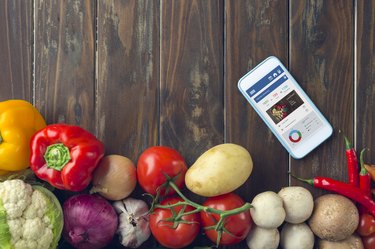
Between your doctor, other healthcare providers and information you see online, it's possible you've heard some conflicting information about a key concern: How many carbs should someone with diabetes eat? The short answer is that it depends on several unique factors.
Read more: Why This Dietitian Wants You to Stop Counting Carbs and Start Tracking Net Carbs Instead
Video of the Day
Video of the Day
What Carbs Do
Even for people with diabetes, carbs play a role in the body's proper functioning. They break down into glucose, which is your main source of energy, according to the American Diabetes Association (ADA).
However, large amounts of carbs (especially the wrong ones) in the diet can be a problem for people with type 2 diabetes, as they are the type of food that increases your blood sugar level the most, the ADA says. So, it may be necessary to change how many and what types of carbs you eat to keep your blood sugar under control.
According to the National Institute on Aging, because your body can create energy from fat and protein as well, restricting carbs in your diet doesn't mean that you'll have less energy.
How Many Carbs
Many people with type 2 diabetes are told to reduce their carb intake to help improve their blood sugar levels, although how much you personally should restrict your intake depends on a number of factors, including your age, weight, gender and blood sugar levels, Julie Cunningham, RDN, CDCES, a private practice dietitian and certified diabetes care and education specialist in Hendersonville, North Carolina, says.
"The number of carbs a person needs varies greatly depending on activity level," Cunningham says. "Some people will need as little as 30 grams of carb per meal, and other, very active people might need 75 grams of carb or more at each meal." Working with your diabetes doctor or a diabetes educator can help you establish the right daily number for your exact needs.
Many healthcare providers recommend the consistent carbohydrate diet. This style of eating focuses less on how many carbs you eat over a day and more on spreading out your carbs evenly throughout the day to prevent blood sugar highs and lows. "Counting carbs by the meal and not by the day is key," Cunningham says. "You want to keep your carb intake on an even keel throughout the day, rather than saving up all your carbs and eating them in one large meal — that would cause a big spike in your blood sugar."
Alternatively, the extremely low-carb, high-fat ketogenic diet (less than 50 grams of carbs per day) shows promise for diabetes, according to a report in the September 2018 issue of Expert Review of Endocrinology & Metabolism. On this diet, your body shifts from burning glucose as its main fuel to burning fats, and because your carb intake is drastically reduced, this can significantly improve your blood sugar.
In fact, some healthcare providers now recommend the keto diet for people who have trouble controlling their blood sugar levels. However, because it's restrictive, speak to your healthcare provider before starting it, especially if you're taking insulin or medications to lower your blood sugar.
Choosing Healthier Carbs
Regardless of amount, the type of carbs you eat matters when you have diabetes, according to the ADA. Whole, less-processed carbs are best, especially those that have fiber, protein and/or fat, which help to reduce the effect they have on your blood sugar level. These include:
- Fruits.
- Vegetables.
- Nuts.
- Seeds.
- Legumes (all types of beans, lentils and dry split peas).
- Whole grains and breads and pasta made from them.
But the ADA cautions that the starchy foods on this list — whole grains, legumes and starchy veggies like potatoes — should only make up one quarter of your plate at meals. Combining these carbs with other food groups can help keep you more even.
What you want to avoid most of the time are refined grains like white bread and pasta, cookies and cakes, and other low-nutrient, high-sugar foods that have lost fiber and many nutrients during processing. They can cause your blood sugar levels to spike quickly, according to the ADA. Think of fruit juices and sodas as liquid sugar — these beverages also rapidly increase blood sugar levels and should be avoided, too.
- American Diabetes Association: “Understanding Carbs”
- American Diabetes Association: “Get to Know Carbs”
- Expert Review of Endocrinology & Metabolism: “Implementing a Low-Carbohydrate, Ketogenic Diet to Manage Type 2 Diabetes Mellitus”
- Julie Cunningham, RDN CDCES, private practice dietitian, certified diabetes care and education specialist, Hendersonville, North Carolina
- National Institute on Aging: “Important Nutrients to Know: Proteins, Carbohydrates, and Fats”